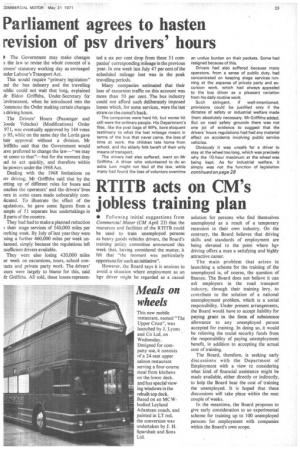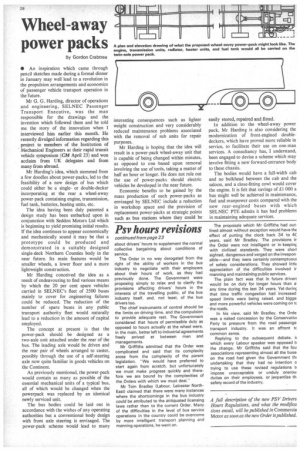Parliament agrees to hasten revision of psv drivers' hours
Page 25

Page 30

If you've noticed an error in this article please click here to report it so we can fix it.
I The Government may make changes a the law to revise the whole concept of a [rivers' statutory working day as envisaged tinder Labour's Transport Act.
This would require "primary legislation" Lnd the bus industry and the travelling )ublic could not wait that long, explained Jr Eldon Griffiths, Under-Secretary for F.nvironment, when he introduced into the 7.ornmons the Order making certain changes a driving hours.
The Drivers' Hours (Passenger and 3oods Vehicles) (Modifications) Order 971, was eventually approved by 144 votes o 95, while on the same day the Lords gave heir approval without a division. Mr 3riffiths said that the Government would Lave preferred to change the law—"we may ret come to that"—but for the moment they Lad to act quickly, and therefore within he powers under the 1968 Act.
Dealing with the 1968 limitations on )sv driving, Mr Griffiths said that by the etting up of different rules for buses and :oaches the operators' and the drivers' lives vere in some cases made unbearably comolicated. To illustrate the effect of the egulations, he gave some figures from a ample of 51 separate bus undertakings in ii parts of the country.
They had had to make a planned reduction a their stage services of 540,000 miles per vorking week. By July of last year they were .)sing a further 460,000 miles per week unharmed, simply because the regulations left asufficient drivers available.
They were also losing 420,000 miles ler week on excursions, tours, school conracts and private party work. The drivers' [ours were largely to blame for this, said 4r Griffiths. All told, these losses represen
ted a six per cent drop from these 51 companies' corresponding mileage in the previous year. In one week last July 47 per cent of the scheduled mileage lost was in the peak travelling periods.
Many companies estimated that their loss of excursion traffic on this account was more than 50 per cent. The bus industry could not afford such deliberately imposed losses which, for some services, were the last straw on the camel's back.
The companies were hard hit, but worse hit still were the ordinary people. His Department's files, like the post bags of MPs, bore eloquent testimony to what the lost mileage meant in terms of the bus that never came, the loss of time at work, the children late horse from school, and the elderly folk bereft of their only means of transport.
The drivers had also suffered, went on Mr Griffiths. A driver who volunteered to do an extra turn might run foul of the law, while many had found the loss of voluntary overtime an undue burden on their pockets. Some had resigned because of this.
Drivers had also suffered because many operators, from a sense of public duty, had concentrated on keeping stage services running at the expense of private party and excursion work, which had always appealed to the bus driver as a pleasant variation from his daily routine work.
Such stringent, if well-intentioned, provisions could be justified only if the dictates of safety or industrial welfare made them absolutely necessary, Mr Griffiths added. But on road safety grounds there was not one jot of evidence to suggest that the drivers' hours regulations had had any material effect on accidents involving public service vehicles.
about drivers' hours to supplement the normal collective bargaining about conditions of service.
The Order in no way derogated from the right of the ability of workers in the bus industry to negotiate with their employers about their hours of work, as they had previously done. The Government were proposing simply to relax and to clarify the provisions affecting drivers' hours in the interests of the travelling public, of the bus industry itself, and, not least, of the bus drivers too.
The chief instruments of control should be the limits on driving time, and the compulsion to provide adequate rest. The Government considered that hours of permissible duty as opposed to hours actually at the wheel were, in the main, better left to industrial agreements freely arrived at between men and managements.
Mr Griffiths admitted that the Order was complicated and said that its complexity arose from the complexity of the parent legislation. "We would have preferred to start again from scratch, but unfortunately we -must make progress quickly and therefore we are bound by the complexities of the Orders with which we must deal."
Mr Torn Bradley (Labour, Leicester NorthEast) claimed that there were many instances where the shortcomings in the bus industry could be attributed to the antiquated licensing laws rather than to the current Order. Many of the difficulties in the level of bus service operations in the country could be overcome by more intelligent transport planning and manning operations, he went on. The proposals which Mr Griffiths had outlined almost without exception would have thE effect of putting the clock back 34 to 4C years, said Mr Bradley. The provisions ir the Order were not intelligent or. in keepinc with civilized standards. They were short sighted, dangerous and verged on the irrespon sible—and they were certainly contemptuouc of safety considerations. They showed link appreciation of the difficulties involved ir manning and maintaining public services.
The plain fact was that in future driven would be on duty for longer hours than a any time during the last 34 years, Yet durinc that time traffic congestion had increased speed limits were being raised, and bigge and more powerful vehicles were coming on tc the roads.
In his view, said Mr Bradley, the Orde was a naked concession by the Conservativc Party to pressure from the road passenge transport industry. It was an affront tc common sense.
Replying to the subsequent debate, ii which every Labour speaker was opposed ti the change, Mr Griffiths said that the fou associations representing almost all the buse on the road had given the Government tho undertaking that they had no intention trying to use these revised regulations to impose unacceptable or unduly onerou: duties on their employees, or jeopardize th safety record of the industry.
Obviously it was unsafe for a driver to stay at the wheel too long, which was precisely why the 10-hour maximum at the wheel was being kept. As for industrial welfare, it simply was not the function of legislation continued on page 28






























































































































